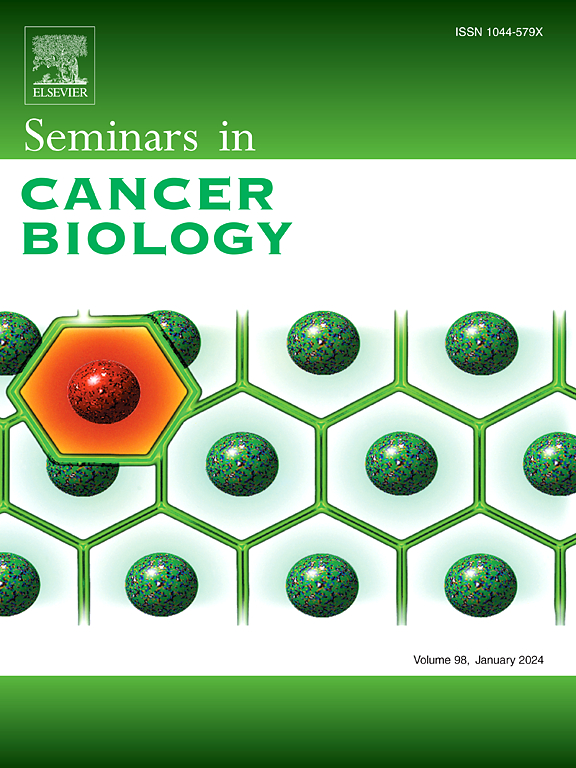Ketogenic diets: Dietary therapeutic potential on breast cancer
IF 15.7
1区 医学
Q1 ONCOLOGY
引用次数: 0
Abstract
Among the various types of tumors, breast cancer (BC) has a high distribution in the world population and is responsible for a high mortality rate. Like other forms of cancer, BC is characterised by distinctive features such as high-energy metabolism in tumor cells, genetic mutations, and mitochondrial dysfunction that sometimes make conventional therapies less effective. However, there is a growing awareness of the vital role played by diet therapy in the overall management of the patient with BC, both by supporting standard therapy and by directly targeting aberrant biological processes involved in carcinogenesis. Among the various nutritional strategies, the ketogenic diet (KD) has recently emerged as a promising therapeutic option for BC. Emerging evidence shows that KD, whether used alone or in combination with standard care, can directly influence tumor cell metabolism and reduces the risk of metastasis, thereby enhancing the efficacy of conventional drug therapies. This may allow for drug dose optimization, leading to fewer side effects and improved patient's quality of life. Nonetheless, the lack of clear evidence on the nutritional protocol to be adopted in BC patients, underlines the need for further research. This review aims to provide an overview of the effects of KD in the management of BC, both as a nutritional treatment and as an adjuvant therapy, providing insights into the implementation of precision nutrition protocols for this and other types of cancer.
生酮饮食:饮食治疗乳腺癌的潜力。
在各种类型的肿瘤中,乳腺癌在世界人口中分布高,死亡率高。与其他形式的癌症一样,BC具有独特的特征,如肿瘤细胞的高能量代谢、基因突变和线粒体功能障碍,这些特征有时会使常规治疗效果降低。然而,越来越多的人意识到饮食疗法在BC患者的整体管理中所起的重要作用,无论是通过支持标准疗法还是直接针对致癌过程中涉及的异常生物过程。在各种营养策略中,生酮饮食(KD)最近成为一种有前途的治疗BC的选择。新的证据表明,无论是单独使用还是与标准治疗联合使用,KD都可以直接影响肿瘤细胞代谢,降低转移风险,从而提高常规药物治疗的疗效。这可能允许药物剂量优化,导致更少的副作用和提高患者的生活质量。尽管如此,缺乏明确的证据表明在BC患者中采用的营养方案强调了进一步研究的必要性。本综述旨在概述KD作为一种营养治疗和辅助治疗在BC治疗中的作用,为这种和其他类型癌症的精确营养方案的实施提供见解。
本文章由计算机程序翻译,如有差异,请以英文原文为准。
求助全文
约1分钟内获得全文
求助全文
来源期刊

Seminars in cancer biology
医学-肿瘤学
CiteScore
26.80
自引率
4.10%
发文量
347
审稿时长
15.1 weeks
期刊介绍:
Seminars in Cancer Biology (YSCBI) is a specialized review journal that focuses on the field of molecular oncology. Its primary objective is to keep scientists up-to-date with the latest developments in this field.
The journal adopts a thematic approach, dedicating each issue to an important topic of interest to cancer biologists. These topics cover a range of research areas, including the underlying genetic and molecular causes of cellular transformation and cancer, as well as the molecular basis of potential therapies.
To ensure the highest quality and expertise, every issue is supervised by a guest editor or editors who are internationally recognized experts in the respective field. Each issue features approximately eight to twelve authoritative invited reviews that cover various aspects of the chosen subject area.
The ultimate goal of each issue of YSCBI is to offer a cohesive, easily comprehensible, and engaging overview of the selected topic. The journal strives to provide scientists with a coordinated and lively examination of the latest developments in the field of molecular oncology.
 求助内容:
求助内容: 应助结果提醒方式:
应助结果提醒方式:


